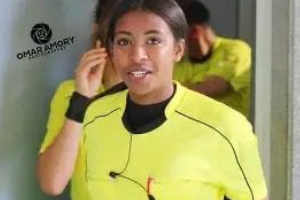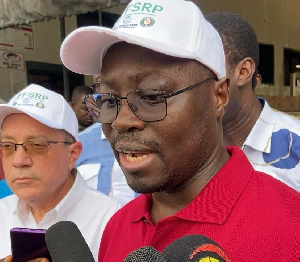There was yet another act of remorse, apology and reconciliation at the National Reconciliation Commission on Tuesday when a teacher from the Ghana International School, Mr Winfred Ellis Dzandu, asked for forgiveness from Mr Michael Dumahassie for the torture he went through at the hands of soldiers at Wusuta in the Volta Region in 1982.
Mr Dzandu conceded that although he did not take part in Mr Dumahassie?s torture, he has accepted responsibility for calling him to explain to a gathering at Wusuta an alleged clash at Ho involving Mr Dumahassie and two others on one side and some chiefs from the area on the other.
He said as leader of a Student Task Force at Wusuta he was briefed by the chiefs about the existence of rival PDCs in the town and a subsequent clash at the Ho Mortar Regiment. He explained that shortly after inviting Mr Dumahassie to explain to the gathering, he took back stage and later got to know that Mr Dumahassie had been beaten mercilessly.
According to him, he had even long forgotten about the incident till he returned home 18 years later when his father informed him that a fetish had sent for him to come and answer questions about the case.
Earlier, Mr Dumahassie had informed the commission that he had lost his manhood and seven wives as a result of the torture he received at the hands of two soldiers at the gathering. He said he and his two friends only opposed the involvement of chiefs in the formation of PDCs and went to the Ho barracks to complain to a colonel, whose name he could not remember. He said it was on their return to Wusuta that a meeting to was called and Mr Dzandu invited him to explain to the gathering what actually transpired at Ho.
According to Mr Dumahassie, as soon as he stepped out, he was pushed by two soldiers who started beating him with their belts and butt of their guns. They also hit him in the waist and groin.
He said his wives felt highly embarrassed by the assault and left him. He told the commission that he has 19 children by the seven wives.
Mr Dumahassie said he felt so bad about his predicament that he sent Mr Dzandu to a shrine to enable the fetish priest determine what he had done to warrant such an ordeal.
When Mr Dzandu apologised to him, he said he had accepted it wholeheartedly but wanted to know who might have asked the soldiers to beat him.
He said his appearance before the commission gives him the inner peace to let the people of Wusuta know that he did not do anything wrong before he was beaten.
He told the commission that the people in the town still believe that he did something nasty at Ho that warranted his torture at the hands of the soldiers.
Most Rev Gabriel Charles Palmer-Buckle, a member of the commission, urged the two men to extend their reconciliatory act to their various homes since there is evidence that the families might be at loggerheads as a result of the incident.
When he took his turn, Mr Ricky Nelson Atianah, a lotto receiver, said although his personal and company?s accounts were frozen, leading to a loss of his business, his presence at the commission was to let Ghanaians know how many people were unjustly treated by the AFRC and PNDC regimes.
He said the opportunity to tell his stories alone gives him the greater satisfaction than any compensation that may be given to appease him. ?I believe the perpetrators must have received their punishments from God and shown remorse already,? he said. He said the work of the commission will actually enlighten public office holders to avoid abusing their positions and respect the rights of others, and commended the President, Mr J, A. Kufuor, for his foresight in setting up the commission.
Mr Atianah said during the days of the AFRC, his shop was raided while he was away undertaking some rehabilitation projects for the then Cocoa Marketing Board as a contractor. He said although the soldiers left a message for him to report to the barracks, he refused because of the prevailing tension in the country and a soldier friend?s advice that in his own interest, he should not to go to the barracks. He said the value of his drinks at the time was about ?22,000.
Mr Atianah said three days after the December 31, 1981 coup d?etat, he was picked up by five policemen and sent to the Gondar Barracks. He told the commission that he was kept in detention at various prisons for political reasons. He said he was the constituency treasurer of the People?s National Party branch at Ho when he was arrested. According to Mr Atianah, it was after their release that they were informed that those of them who had more than ?50,000 in their accounts had had their accounts frozen.
Another petitioner, Mr Daniel Mensah Domeakpor, narrated how he was shot in a car at Taviefe Junction by WOII Tonyevie for no apparent reason in May 1987. He said after his discharge from hospital, he reported the incident to the police but he was told he had no case.
He said he was informed that the officer visited him while he was in a coma at the hospital but never took
responsibility for the bills or visited him thereafter. The case was, however, adjourned to enable the commission arrange a counsel for WOII Tonyevie who was present.
On his part, Mr Kojo Ayigwa, a resident of Awoshie, said a Mercedes Benz cargo bus he sent to his brother in-law at Obuasi, was seized by soldiers in an operation in 1984. He said he brought the vehicle and some spare parts from Germany to settle in the country after 14 years in that country.
He said he later decided to leave the bus with his brother in-law when he had planned to return to Germany to join his wife.
According to him, he had asked for permission from his employers, the Volkswagen company in Germany, to return home to retrieve the bus since he had documents covering it.
He said his enquiries led him to the Second Brigade Headquarters in Kumasi where he allegedly saw the bus but was threatened by Lt Col Adurogo not to come to the barracks again or have himself to blame.
He said several petitions, including one to the Commission on Human Rights and Administrative Justice, did not yield any result.
Mr Ayigwa said he had to return to Germany very disappointed and had his problem compounded when he and his wife got separated.
He said as a result of the alimony he was paying to the wife, he decided to return to Ghana.
Lt Col Adurogo, who was present, denied knowledge of the man but said the vehicle could have been confiscated all the same.
He said the seizure of the property at Obuasi was part of an exercise by the 4BN and not the 2 Brigade.
Lt Col Adurogo said all those who were affected by the exercise were directed to the 4BN to check on their confiscated property, since it was not the 2 Brigade which undertook the exercise.
He conceded having seen a message from the Military Police Headquarters in Accra to its unit at the 4BN to escort the said vehicle to Accra but said he does not know what happened afterwards because he was not involved in the operation although his name was mentioned.
He told the commission that since the petitioner said the vehicle was registered and licensed, there should be records at the 4BN or the Driver and Vehicle Licensing Authority to know the vehicle?s whereabouts.
A baker from Swedru, Madam Mabel Kaitoo, who had appeared before the commission two weeks ago, tendered documents in support of her petition
General News of Wednesday, 2 April 2003
Source: gna












